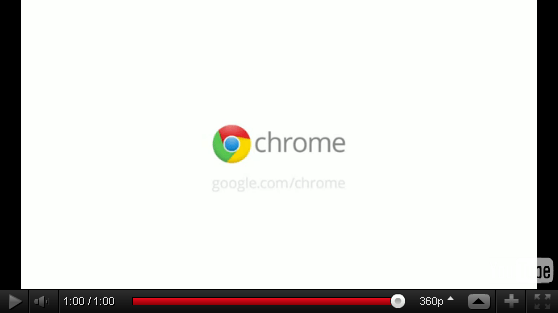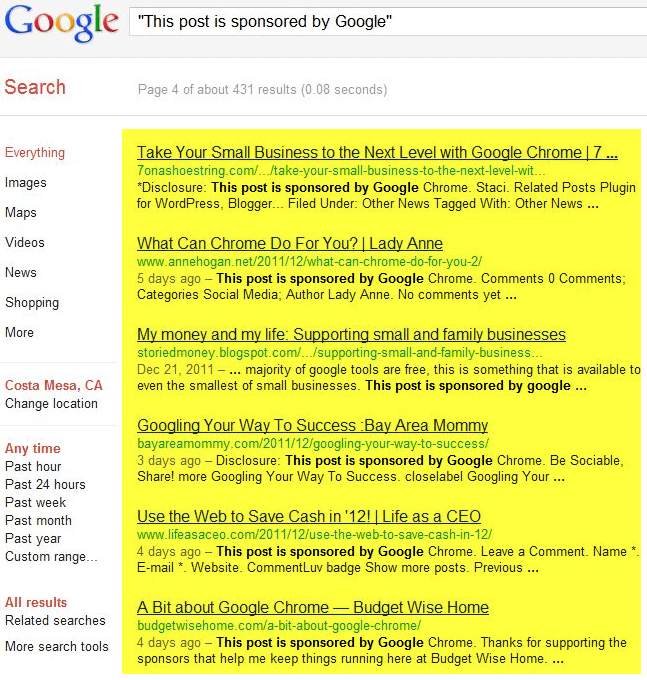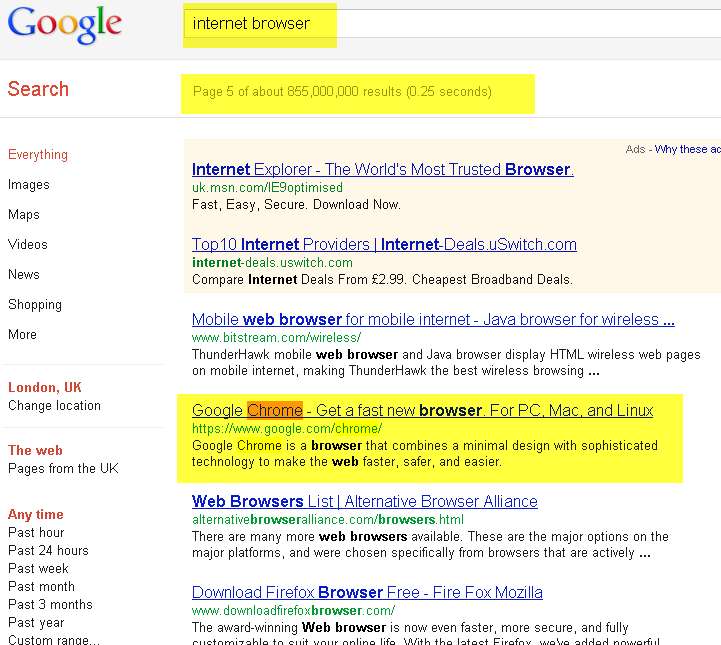 “Fate. It seems, is not without a sense of irony.” My last post had a huge section on Google’s efforts to combat poorly constructed, spammy and thin content. Last week, Aaron Wall of SEO Book exposed Google doing the opposite of what they are actively and public against. Google hired a digital agency, Essence, that initiated a marketing campaign which generated a lot of poorly written paid blog posts promoting the Chrome product, at least one of the posts were found containing followed backlink to the Google Chrome page.
“Fate. It seems, is not without a sense of irony.” My last post had a huge section on Google’s efforts to combat poorly constructed, spammy and thin content. Last week, Aaron Wall of SEO Book exposed Google doing the opposite of what they are actively and public against. Google hired a digital agency, Essence, that initiated a marketing campaign which generated a lot of poorly written paid blog posts promoting the Chrome product, at least one of the posts were found containing followed backlink to the Google Chrome page.
What happened?
If you haven’t been keeping up with this news, below is a quick summary of what happened:
- Google initiated a new campaign, along with a video ad, promoting how beneficial Chrome could be for small businesses and start ups.
- Instead of [for reasons still unknown] marketing the YouTube ad themselves, Google enlisted the service of a digital media agency – Essence.
- But the Baton doesn’t stop there, apparently Essence then hired another agency, Unruly. They were the ones that actually implemented the campaign promoting this YouTube advert for Google chrome:

- The Unruly campaign for Google Chrome is largely paying bloggers to generate content promoting the benefits of Google Chrome to small businesses. This of course generated a lot of poor content in Google’s search results written solely to promote the Chrome product – exactly what Google has been looking to eradicate and punish.
- Unfortunately for the parties mentioned above, at least one blog post was spotted to have direct and followed link to the Google Chrome page (passing link juice on), which turns paid blog articles into paid links, aka buying links.

- Unruly has came out and said they would never ask any bloggers to link back to an advertisers website, I believe them, why would they? Instead, they could just build a campaign to buy promotional blog posts and hope bloggers would link to the advertisers anyway. If the client had been anyone other than Google, this case would have never got this much exposure. I’m sure this same tactic worked for many clients before Google.
The accidental links that came out of this campaign is not what we should be focusing on, rather the amount of poor quality and thin content generated as a result of the unruly campaign promoting the Chrome advert, which was not an accident! If you do a search for “this post is sponsored by Google” Google will return hundreds of results full of rubbish content written to promote the video.

The Unruly campaign generated for Google Chrome is exactly what Matt Cutts and the Panda updates has been fighting against – bad quality content.
How Google responded
Google has responded very well to this whole situation, probably partly due to experience. In 2011 Google banned BeatThatQuote.org [one of Google’s own] for violating the webmaster guidelines. In 2009 Google Japan was also banned for paying bloggers to review the search engine.
Below is what Matt Cutts the Head of Webspam team at Google responded with:
In response, the webspam team has taken manual action to demote www.google.com/chrome for at least 60 days. After that, someone on the Chrome side can submit a reconsideration request documenting their clean-up just like any other company would. During the 60 days, the PageRank of www.google.com/chrome will also be lowered to reflect the fact that we also won’t trust outgoing links from that page.
A 60 days ban is quite respectable and the Chrome page falling over 50 places for terms such as “browser” or “internet browser”. Google did have to be harsh on its own property as this is the kind of practice they are very vocally against. Google’s PR department handled this very well.
Whichever way you look at this, Google have messed up. If they are not buying links they cannot deny they knowingly initiated a campaign that paid bloggers generate poor quality promotional content for the Chrome product.

Buying links
There is a lot of confusion on this topic in the industry, so while we are here I thought I’d add a quick bonus section to clarify some myths and facts surround paid links.
Link buying myths
- Paying someone to build links for your website is buying links – Not necessarily, unless the person you are employing is paying a webmaster to have your link placed on a website, and then it’s buying links. Much like this situation with Google.
- Google cannot tell if my links are paid for – although no one knows exactly, but Google’s algorithm must have the ability to spot unusual linking patterns and the evolution of a websites link profile. As well as the algorithm, Google’s huge cache also helps them to track forums and messages for buying and selling activities long after they have been deleted.
- Premium directory submissions is buying links – No, it is not, directory submissions is a form of advertising, just as you would put a banner on a website. Paying for the submissions should only be for speeding up the review and not acquiring the link itself.
Link buying facts
- Paying a webmaster to place your link on his website is buying links – This is the perfect description of buying links, and if you are doing this, you are violating Google’s webmaster guidelines.
- Big brands as well as small businesses all buy links – this is true, most recently Overstock, JC Penny and Forbes all have been penalised by Google for using paid links as part of their digital marketing campaign. Even the big boys do it, and even they get caught.
Image Source
British Pounds Proudly Present Their Faces via BigStock





Leave a Reply